April 13, 2025 | 21:14 GMT +7
April 13, 2025 | 21:14 GMT +7
Hotline: 0913.378.918
April 13, 2025 | 21:14 GMT +7
Hotline: 0913.378.918
Ms. Nguyen Thi Thanh Tuyen, a fisherwoman in Long Hai town, Long Dat district (Ba Ria-Vung Tau), had a fishing vessel with a length of nearly 7 meters to exploit in the inshore area by a retractable net. This vessel was categorized as engaging in IUU fishing – illegal, unreported, and unregulated due to lacking legal papers.
At the end of 2024, the town officials came to make papers for the family's vehicle, but due to practicing the prohibited job, they were not granted a fishing vessel registration certificate without switching the job.
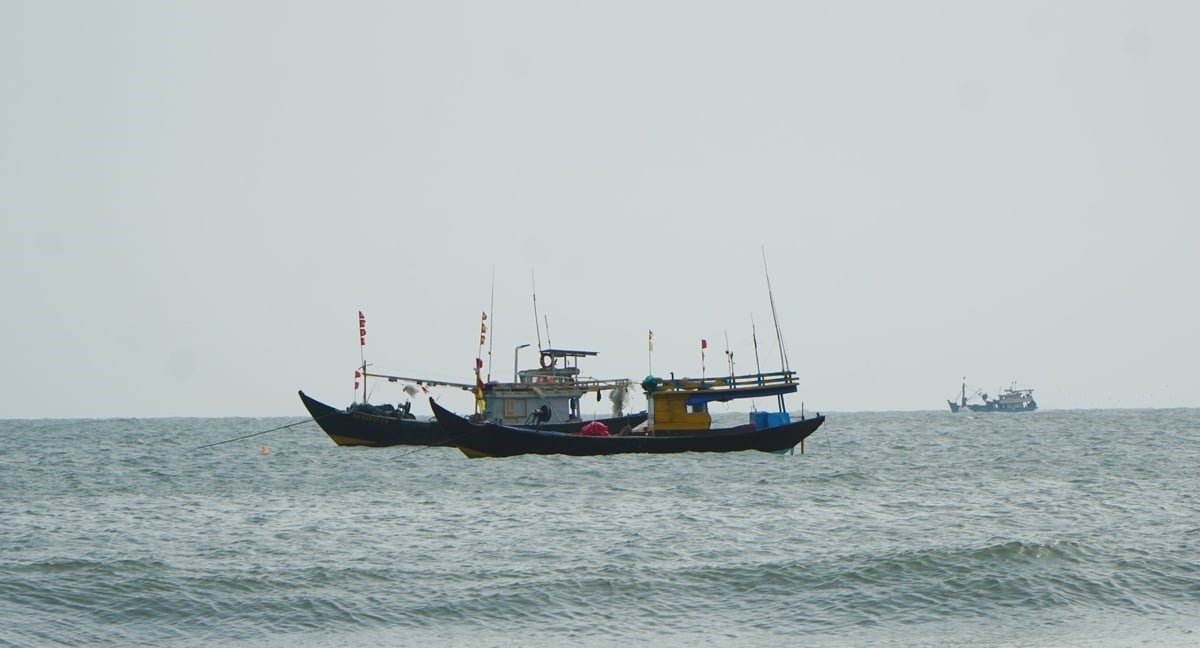
The fishing vessels using fishing tools that endanger and destroy aquatic resources, the habitat of aquatic species, and aquatic ecosystems in Ba Ria-Vung Tau are gradually switching to more environmentally friendly jobs. Photo: Le Binh.
Fishing is a long-standing traditional profession of the family, transmitted from her father's life to her husband's life, so the family has wondered a lot. After analyzing the advantages and disadvantages of her job, Ms. Tuyen understood that in the long term, she could not continue this job due to the destruction of aquatic resources. Therefore, from the beginning of 2025, the family decided to switch to sentinel crab net fishing.
Now, the vessel catches about a dozen kilograms of sentinel crabs and fish every day. After deducting costs, the profit earned is about VND 800,000 to VND 1 million/day. According to Ms. Tuyen, this income level will ensure stable livelihood for fisherpeople after they switching jobs. "The cost of job conversion is not too large, we spent mostly on a new net, which costed about VND 5 million," Ms. Tuyen said.
Similarly, implementing the policy of transforming livelihood under the Provincial People's Committee, from August 2024, Mr. Tran May (Binh Chau commune, Xuyen Moc district) converted two fishing vessels with a capacity of 400 CV practicing drag-net fishing to trawl net for offshore exploitation of mackerel and tuna.
"The cost of conversion is over VND 1.1 billion/ship, including the investment cost of a new 10-km-long fishing net worth more than VND 800 million, plus about VND 300 million to repair vessels and the tunnel containing the net and fish," Mr. May said.
Currently, on a 20-day sea trip, each fishing vessel catches about 2-4 tons of mackerel and tuna, generating revenue of VND 150-200 million. After deducting expenses and labor, he still has a profit of VND 80-100 million. With this profit, Mr. May estimates it takes about one year to regain his job conversion capital.
Meanwhile, lacking money to renovate the ship, Mr. Nguyen An Huu (Phuoc Hoi commune, Long Dat district) sold his decked fishing vessels of 18 meters in length. He then bought another smaller one with a length of 12.3m using trawl nets to catch sentinel crabs and fish.
"The cost of improving the ship from retractable nets to trawl nets is very high, VND 1-1.5 billion, so the family does not have enough money. Therefore, after many days of calculating and consulting friends, we decided to sell the ship and buy another smaller one. The ship is worth VND 450 million for sentinel crab net fishing because this job is extremely moneymaking," Mr. Huu shared.
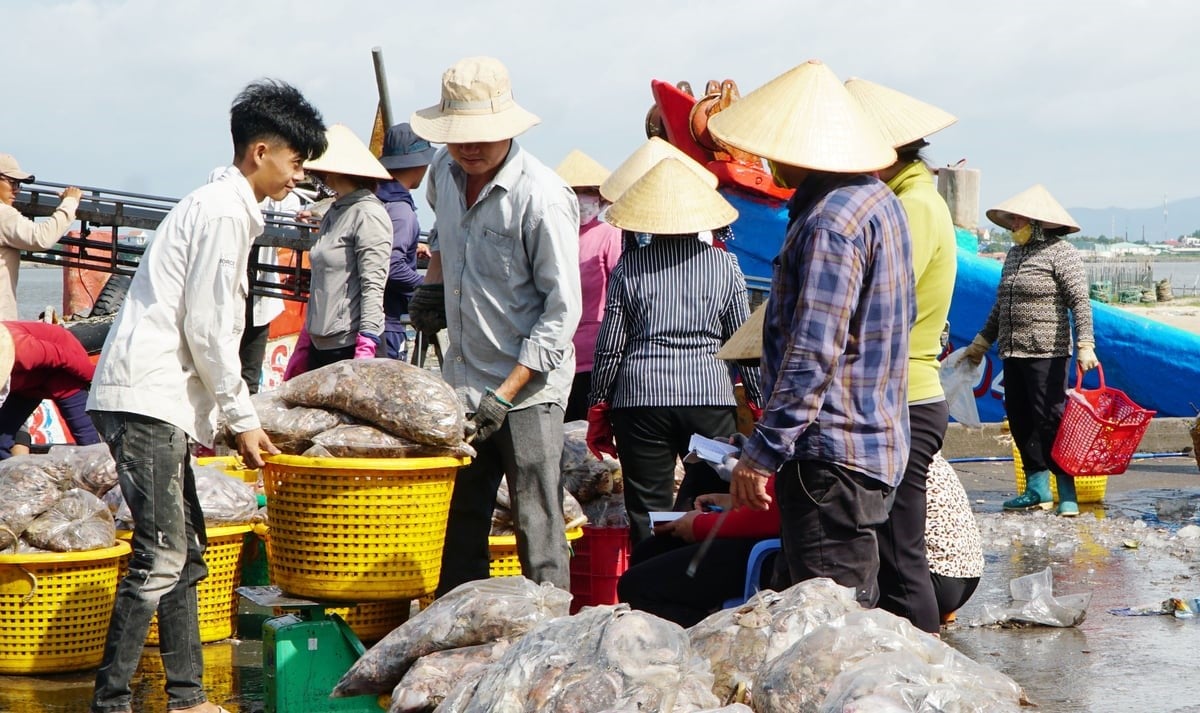
The fact that fishing vessels comply with the job transformation not only helps Vietnam quickly remove the IUU "yellow card" but also promotes the sustainable development of the fisheries industry. Photo: Tran Phi.
Currently, on each sea trip lasting 1-2 days, Mr. Huu's ship catches an average of about 40kg of sentinel crabs and fish of all kinds, sold for VND 3-4 million. After deducting the petrol, oil, food, and labor costs, he still earns a profit of VND 2-2.5 million/trip.
Ms. Pham Thi Na, Deputy Director of the Provincial Sub-Department of Agriculture and Environment of Ba Ria-Vung Tau, said that in 2024, the Sub-Department, along with localities and border guards, had many sessions to disseminate information to fishermen about job conversion from prohibited jobs (dragnet, cage traps) to environmentally friendly jobs (such as net fishing and squid fishing).
Especially in the peak of thoroughly handling IUU fishing vessels in the fourth quarter of 2024, functional forces have strongly disseminated to ship owners. If fishing vessels still practice prohibited and harmful jobs, they will not be issued the registration certificate and the fishing license and will not be allowed to leave the wharf to set sail. As a result, hundreds of shipowners have made a commitment to switch jobs.

Through the model of "morning coffee with fishermen" in localities, people's awareness of obeying the regulations is increasingly improved. Photo: Le Binh.
Statistics in early 2025 indicated that the number of environmentally friendly fishing vessels, such as those using tunny nets, trawl nets, and troll fishing, has increased sharply compared to the same period in 2024. Of which, the strongest increase is the fishing vessel using trawl nets, tripling to currently 1,740 vessels. The fishing vessels with tunny nets and troll fishing also increased by 16.5% and 12%, respectively, compared to the same period in 2024, to 275 and 250 ships.
Types of fishing vessels practicing prohibited jobs, such as dragnet, cage, and trap, are also on the downtrend. In particular, dragnet fishing vessels have decreased by 121 ships to 1,268 ships.
According to Ms. Pham Thi Na, this is the result after many years of livelihood transformation, reducing fishing vessels operating in coastal areas and exploiting aquatic resources and ecosystems, and increasing more environmentally friendly fishing jobs with less impact.
"Previously, dragnet fishing reduced aquatic resources, destroyed the bottom floor environment, and imbalanced the marine ecosystem. This is the most important object that the province and localities pay attention to, encouraging fisherpeople to convert," Ms. Na said.
The province has implemented many measures to manage the operation of dragnet fishing vessels, such as banning operations in the growing season; banning the new construction of dragnet ships; and not granting new licenses, as well as not re-granting licenses for this profession in the inshore and coastal areas. Particularly, gradual decrease in the offshore area by not allowing new construction; the number of existing dragnet ships, when their operating term ends, will self-release. With this policy, since 2020, the number of dragnet fishing vessels in the province has decreased by approximately 350 ships.
Besides, localities also increase the reduction of fishing vessels operating in the inshore and coastal areas, especially destroyed and banned jobs, to reduce over-exploitation pressure and protect mother fish and offsprings in the breeding season.
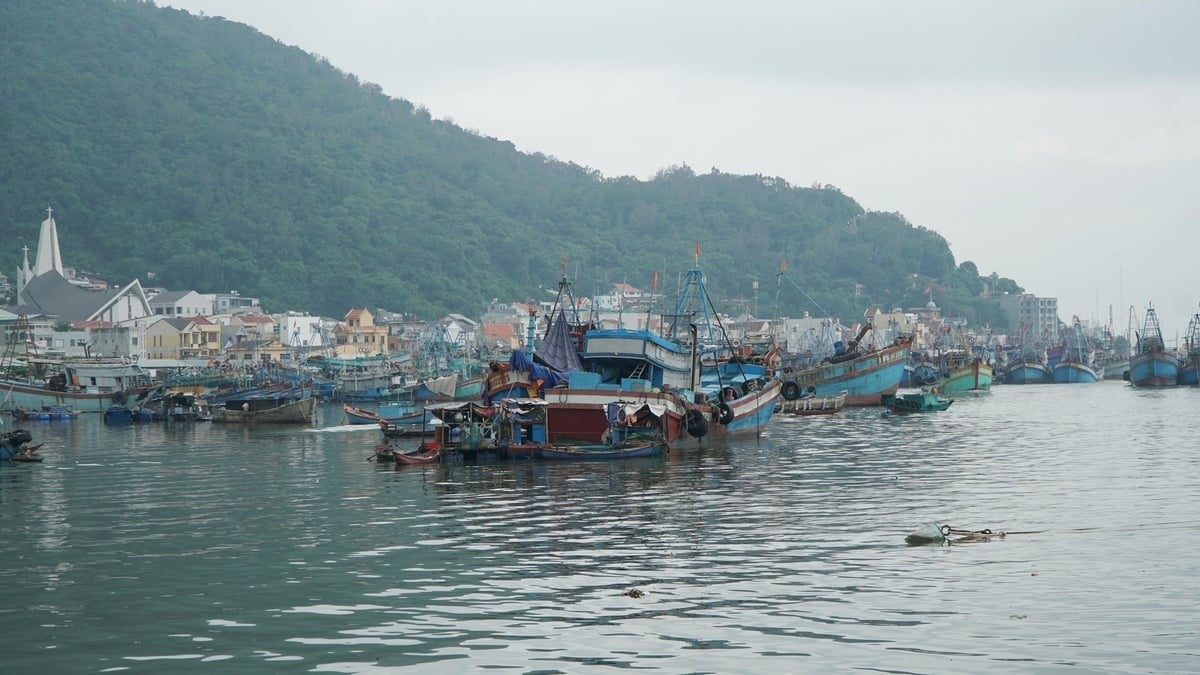
Ba Ria-Vung Tau also plans to "ban the sea" during the fixed period and guide fishermen to fish in the area and season for fish and shrimp to reproduce and develop. Photo: Tran Phi.
In 2024, the Sub-Department of Agriculture and Rural Development (now the Department of Agriculture and Environment) submitted to the Provincial People's Committee, waiting for the approval of the scheme on switching jobs of coastal fishing vessels and jobs destroying aquatic resources in the province to fishing jobs with high selectivity and environmental friendliness.
In addition to encouraging fishermen to switch to environmentally friendly fishing jobs and services combined with tourism, the agricultural sector also enhances the dissemination and management of operational industries, fishing areas, and the size of the mesh to protect the space and living environment for aquatic species to grow.
"The province is also planning to build coral reefs and artificial ecological carpets to form areas for the breeding season in Vung Tau city, Xuyen Moc district, and Con Dao National Park. Besides, build cost-supporting policies for fishermen to change jobs and release fishing vessels with the destruction of aquatic resources and the environment," said Pham Thi Na.
* USD 1 = VND 25,750 (Exchange rate updated on April 8, 2025; Source: Vietcombank)
Translated by Thu Huyen
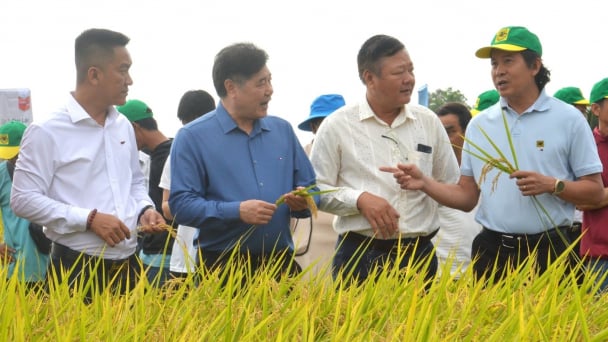
(VAN) The results from pilot fields are catalyzing the expansion of the One million hectares of high-quality, low-emission rice project in Kien Giang.
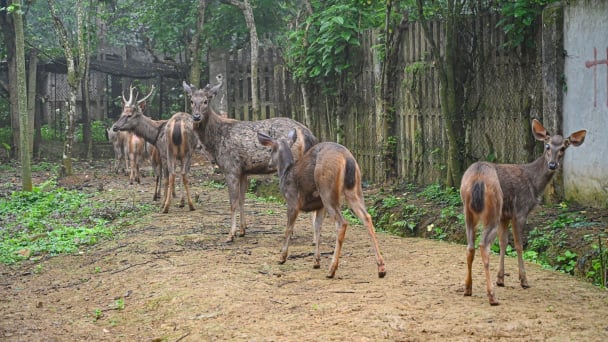
(VAN) On the morning of April 11, Cuc Phuong National Park received 18 individuals of endangered and rare wild animals from Da Nang city.
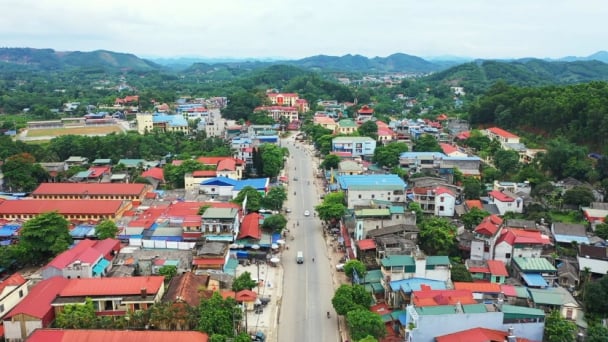
(VAN) FAO supports Vietnam in enhancing survey sampling techniques for the 2025 nationwide agricultural and rural census.
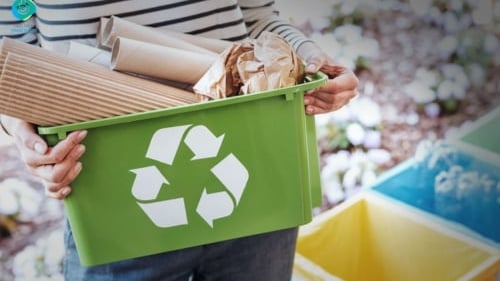
(VAN) By participating in the green transition, manufacturers become an indispensable part of the circular economy, contributing to resource optimization and environmental protection.
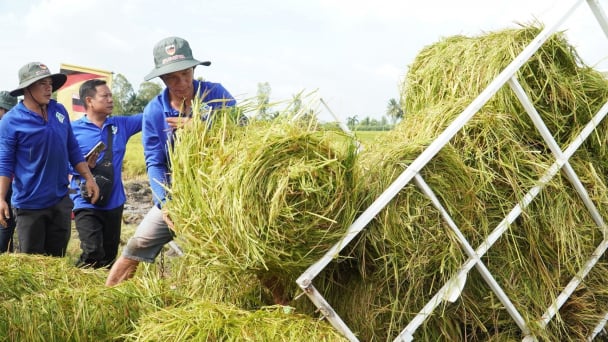
(VAN) The One Million Hectares of High-Quality and Low-Emission Rice Program can generate nearly 14 million tons of straw annually, posing an urgent requirement to diversify straw-based products.
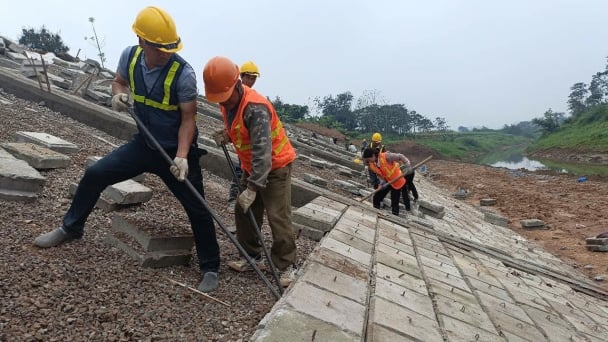
(VAN) This figure was recently announced at a conference held in Yen Bai, focusing on climate-resilient infrastructure development for ethnic minority regions.
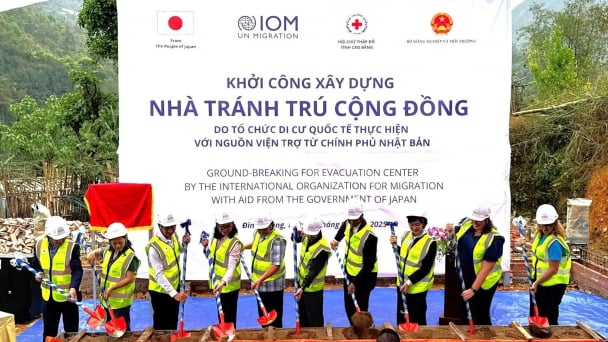
(VAN) The evacuation center is a practical work in efforts to respond to natural disasters and adapt to climate change in vulnerable areas.